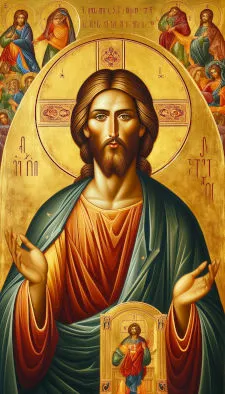That Guy, Jesus
This text is written in 2025. The year before was 2024, and before that, 2023. You may keep going backwards one year at a time. Finally, you will reach year 1. (Year zero does not exist.) Why did people start counting years from that point?
Keeping track of years this way has a fine Latin name: Anno Domini, which means the year of the Lord. In English, of course, the abbreviation A.D. is used. In a global perspective, many different calendars and year counts are used. Most are linked to important, local events. Nevertheless, they must all know how to relate to Anno Domini.
During the French Revolution a different calendar, the Republican calendar, was launched. Its first year was anchored at 1792 A.D. It was used for about twelve years before being abolished. Making weeks ten days long may have contributed to its failure, but most of all, the French Revolution was not a significant enough event to define a new way of counting years.
Now, if Anno Domini is the year of the Lord, who is the Lord?
It is Jesus Christ.
His year of birth marks the beginning of the year of the Lord.
 Modern research has concluded that he was actually born a few years before 1 A.D.,
but the idea remains.
Modern research has concluded that he was actually born a few years before 1 A.D.,
but the idea remains.
It is hard to overlook that something happened in the year 1 A.D. that made the whole world count years in a new way. Something considerably more revolutionary than the French Revolution.
Christianity and the Roman Empire
Section titled “Christianity and the Roman Empire”Jesus Christ was born and lived in Israel, which, at the time, was occupied by the Roman empire. Jesus left no writings, only a group of followers who, after some time, were called Christians. As viewed by the Romans, they were an insignificant cult. They were persecuted because they kept insisting that someone was Lord who was not the Roman Emperor.
A staggering development took place. After three or four centuries, Christianity became the state religion of the empire. It kept spreading in what we now know as Europe (the term did not exist back then). Europe was the first Christian continent.
About 300 years ago, in present-day Germany, the composer Johann Sebastian Bach was born. A large part of his enormous legacy is directly inspired by the Christian faith and by the person, Jesus Christ. His music is still prominent, being frequently performed and found on countless recordings.
Georg Friedrich Handel wrote his oratorio Messiah in 1741—several hundred pages of sheet music— in just a couple of weeks. It is all about Jesus. The lyrics consist of Bible quotes. This masterpiece is still regularly performed, often at Easter time. Numerous recordings are available.
Those composers were Christians. Their faith was the force that released creativity enough to compose music that is still played and is highly esteemed 300 years later.
Science
Section titled “Science”The worldview of the Christian faith became the end of the idea that the planets are gods and that the heavenly bodies control our lives. The notion that the spirits of ancestors live on in trees and stones also dissolved. A new perspective opened up, an opportunity to examine nature without risking offending the deities.
The outcome was modern natural science. Modern science grew out of Christian Europe. The classical scientists who founded modern science were Christians, and not just Christians, as it were, besides their scientific work. Their Bible-based worldview was the decisive push that liberated them to think in a way that we now call scientific.
Sir Isaac Newton was one of them. He drew up the laws of motion that made it possible to calculate planet orbits and many other things. No laws of nature have survived as long as they did. Only after 200 years, Einstein discovered that they do not apply at velocities nearing the speed of light.
Current Statistics
Section titled “Current Statistics”In 2020, the total number of Christians globally was estimated at 2.4 billions, a fair share of the world’s population.
Conclusion
Section titled “Conclusion”Every person has a free will, but disregarding Jesus Christ leaves a bunch of historical facts without explanation.